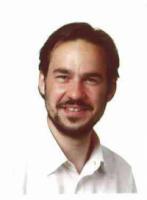Koch, Steffen | Germany

Born 1976 in Sangerhausen, Germany, I studied Environmental engineering at Martin-Luther-University Halle-Wittenberg Germany, from 1996 to 2002. During a gap year placement between Nov. 2000 and Sept. 2001 I did some professional training and work at Thames Water’s R&D department in Reading, UK. In 2003 I joined the DFG-Graduiertenkolleg (Research training Group) Technisierung und Gesellschaft at Darmstadt University of Technology, Germany, as a doctoral fellow.
In Sept. 2005 and Apr./May 2006 I was a visiting fellow at the Department Comprehensive Innovation Research in Utility Sectors (CIRUS at Eawag, Switzerland. Since Oct. 2006 I am a fellow of the Institute of Advanced Studies on Science, Technology and Society, Graz, Austria.
I am a doctoral candidate at Institute WAR at Darmstadt University of Technology. My graduate studies focus on the exploration and integration of perspectives of historical and social science on technology into engineering knowledge, especially concerned with water and wastewater infrastructures.
Project at IAS-STS: Infrastructure systems in urban water management – technological changes in historical and socio-technical perspective
Starting from the premise that participation is a vital aspect of sustainability the project aims predominantly to contribute to the engineering perspective. Engineering knowledge is therefore brought together with a wider societal context of technology and its development. The two overall purposes are: firstly to provide an extended foundation for disciplinary reflections and secondly to assist the ability of engineers to take an active part in current and future debates on sustainability, especially of water and waste water services.
In historical case studies a comparison of two different periods in time, a Formation - and a Re-Formation phase of formulating concepts for water and waste water services is carried out. As the matter of enquiry the focus exemplary lies upon the question how rain water is incorporated in these concepts. In relation to different technical solutions for handling rain water especially the position of different actor groups and their influences of the marginalisation/institutionalization process are looked at retrospectively.
For the analysis three different approaches are used as a frame and guide to sort the empirical material: Large Technical Systems (Thomas P. Hughes); Visions of Technology (Meinolf Dierkes et al.) and Socio-technical Regimes (Frank W. Geels). The findings will finally be discussed in order to proof and provide evidence upon the contribution of knowledge from historical and social science as well as to lock out for opportune access to an extended interdisciplinary base of knowledge.
